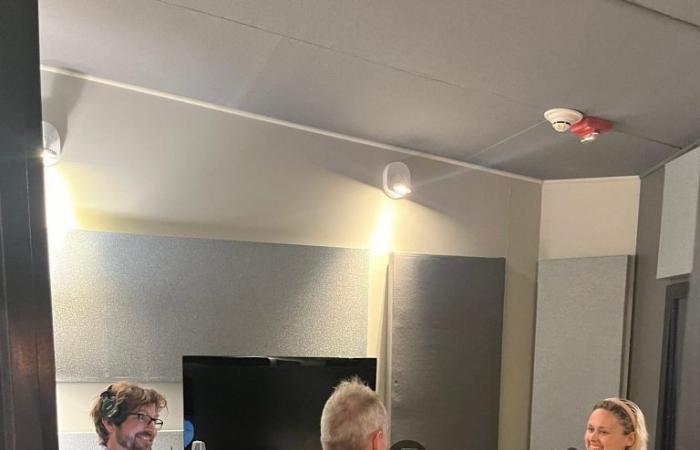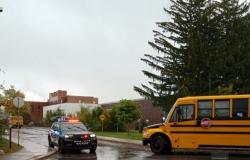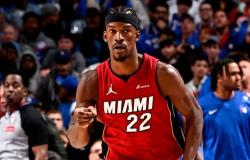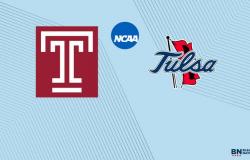SAINT-LEONARD-OF-ASTON. Making science alive and accessible: this is the work of Jean-Daniel Doucet. For nearly fifteen years, he has worked as a science popularizer. A talent that he discovered while he was a researcher in the medical field.
“I became a science popularizer by an accident of life, completely! “, he explains with a laugh. “Around 2009-2010, in the middle of the influenza A (H1N1) pandemic, I had to explain why vaccines were not dangerous. I found this funand I just went that route. »
This direction suited his personality perfectly. It also allowed him to pursue an original career in the field that fascinates him the most: science. “I gave up on medical research because I’m not the best in the lab. I was good at school, but not super skilled. I was the type to burn rice while trying to boil it! So I told myself that I was going to be more useful by giving voice to the scientists who worked with me and who made me tick, than by being one myself; that I would be more useful, too, in trying to inspire other young people to become scientists. This is what I do in my extension work. »
And he is satisfied! Over the years, he has touched several spheres: “I do animation, I sometimes appear in the media, I write for television… In my projects, I often surround myself with artists, people in production, directors, actors. I use artistic elements to give voice to scientists.”
The native of Saint-Léonard-d’Aston has built a solid network. He owes his first steps in popularization to the chemist Normand Voyer, who regularly appears on TV and radio, and for whom Jean-Daniel Doucet was an intern. “He had an extension project and he hired me. This led me to tour schools in Quebec. Then, I got very involved in the Association of Science Communicators. I organized trainings and all kinds of things. It introduced me to a lot of people. »
It was through these contacts that the rest of his career was forged. He hosted the television show Top Science (still available on TFO), to then design, for three years, educational activities at the Montreal Science Center, among a thousand and one other projects.
“Currently, I work a lot in television. I do scriptwriting for the show Courtwhose first season has ended. I am also working on What happens when?a show about extreme science with veterinarian Sébastien Kfoury, who seeks to surpass his limits. I am chief researcher and scriptwriter for half of the episodes. »
The voice of cancer: advances that bring hope
His most recent project allowed him to explore a medium he had not yet touched: podcasting. It was the Montreal Cancer Institute that approached him, through researcher Réjean Lapointe, whom he knew during his master’s degree in biomedical sciences at the University of Montreal Hospital Center (CHUM). “He found that there was little podcast content on the latest treatment options, on how we can approach the delicate issue of cancer by giving some hope to patients and their loved ones. The concept took shape and they came to me to co-write and animate it,” says Jean-Daniel Doucet.
Thus was born the podcast “ The voice of cancer: advances that bring hope“, all eight episodes of which can now be listened to on various platforms, including OHdio, Qub, Apple Podcast and Spotify. They are approximately 30 minutes long each.
“We are addressing various avenues of treatment. They contain plenty of eloquent testimonies. It is touching, informative, accessible and concrete at the same time. We don’t get teary-eyed. We are hopeful. I think it can help people feel better,” describes Jean-Daniel Doucet.
Speakers include personalities closely affected by the disease, including Lolitta Dandoy, Lulu Hughes, DJ Champion and Dominic Arpin, to name a few. Researchers and experts in oncology present the latest advances in research and discuss the most promising treatment options.
The themes covered are ovarian cancer, skin toxicity, breast cancer, cancer 360, prostate cancer, the microbiome, immunocellular therapy and artificial intelligence.
One episode particularly moved Jean-Daniel Doucet: the one about ovarian cancer, from which his mother died in 2008. “In this episode, my sister Édith accompanies me to ask questions about this cancer. She began genetic screening for ovarian cancer to assess her own risks. So together we meet a researcher specializing in the subject. We also talk about our mother. I am happy with the result. For me, this series is a bit of a tribute to my mother. »
He also admits that it was his mother’s cancer that pushed him to pursue his master’s studies at the CHUM and the Montreal Cancer Institute. “It was during my CEGEP that my mother was diagnosed. That turned me towards health sciences: towards a baccalaureate in biochemistry at Laval University, then a master’s degree in biomedical, at the CHUM research center. »
His foray into health sciences made him understand that the fight against cancer was more than a battle: “My father also had cancer, recently, and there was a lot of talk about it. puncherthis cancer. In the podcast, we make less of these comments. Yes, we must fight cancer. Yes, cancer is an enemy. But if we cannot defeat it, perhaps we can live with it; live longer, and with a better quality of life. It’s this dosage that we also explore in the podcast and that I find interesting. We have not given up the fight at all. But finding ways to function despite this illness is an aspect that should not be neglected. »






